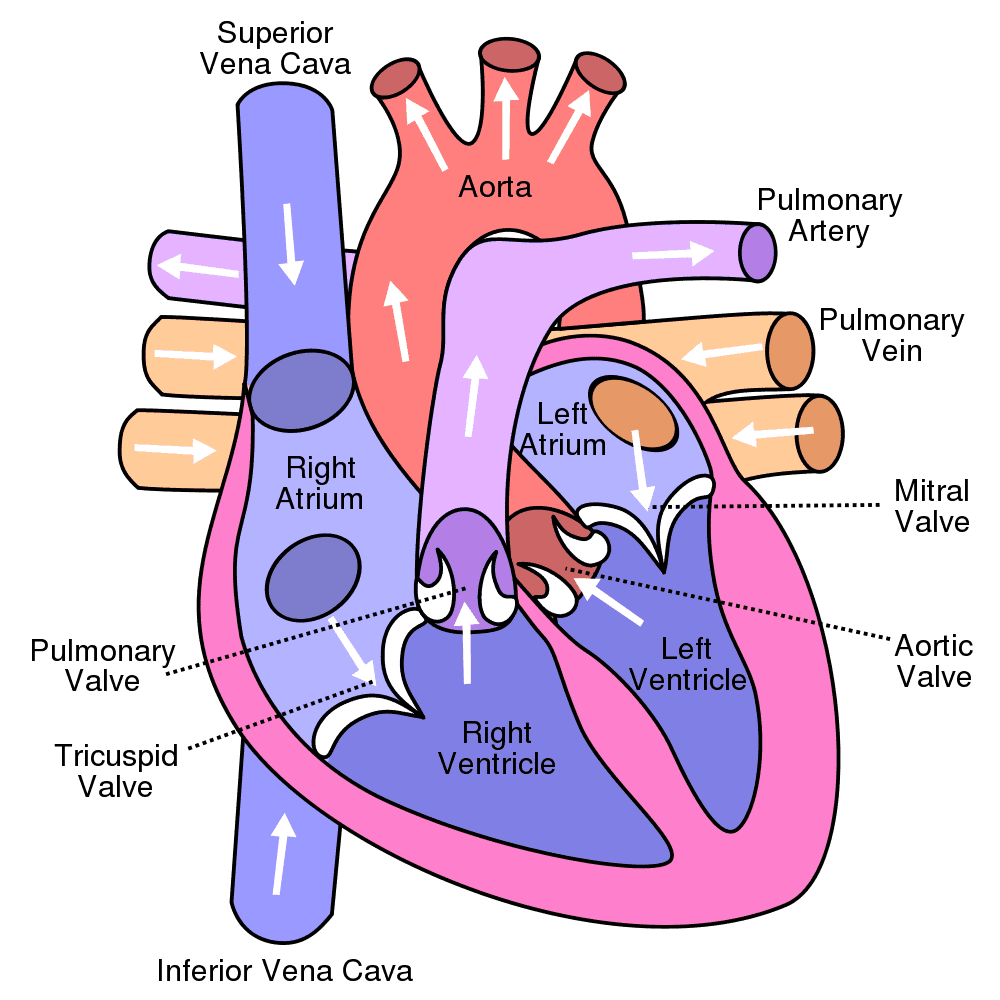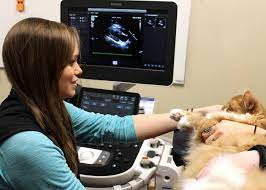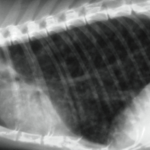What does a murmur mean?
A heart murmur is an abnormal sound your veterinarian can hear when listening to your pet’s heart with a stethoscope. Normally, two distinct sounds are heard when listening to the heart of a normal dog or cat. These are often described as “lub” and “dub.” When listening with a stethoscope one typically hears a: Lub-dub…Lub-dub… sound.
A murmur is an abnormal sound that often sounds like a whoosh in between the lub and the dub. extra sound, which can sometimes drown out the normal sounds.

What causes a heart murmur?
The short answer is turbulent blood flow. Like the water in a calm river or stream, normally blood flows through the heart in a quiet, smooth manner. But, if something obstructs the flow, turbulence is created. The same happens with blood flow through the heart.
Lots of things can cause turbulent flow. To understand what can, have a look at the heart anatomy above. If any of the valves is too small or to large, normal blood flow changes. Some of these changes occur with aging. In a younger animal, a murmur heard may represent a birth defect and be congenital.
The most common murmurs in older dogs are associated with leaky mitral valves. In young cats, thickening of the ventricle walls called hypertrophic cardiomyopathy is a congenital issue.
So, there are many reasons from valvular issues, to constriction of valve size to defects between chambers. Finally, turbulence can be heard when the blood is too thin (anemia) or even when a patient is very excited, causing the heart to pump faster and harder than normal.
Are different types of murmurs associated with specific diseases or conditions?
the short answer is yes, but it’s a little more complex. Murmurs are caused by different structures inside and outside the heart. Your veterinarian can use various clues about the murmur to try to determine what the likely origin is.
For instance: murmurs associated with patent ductus arteriosus are continuous when auscultated in the left armpit while murmurs associated with ventricular septal defects tend to be loudest on the right side (as are murmurs associated with leaky tricuspid valves).
That said, sometimes, it’s impossible to tell the exact nature. Often chest x-rays and a cardiac ultrasound 9echocardiogram) will be recommended. This is especially the case in cats, where most murmurs are heard near the sternum.
What is a benign or “innocent” murmur?
Some heart murmurs are called benign (or innocent or physiological), meaning there is no apparent heart disease that explains the murmur. These murmurs are often seen in puppies and can occur in cats of any age.
They are uncommon in adult dogs. Benign murmurs are usually soft (rather than loud) and can be intermittent. Benign puppy murmurs will generally disappear by 12 to 15 weeks of age.
My pet’s murmur has a grade. What does this mean?

Murmur grading is simply your veterinarian’s way of describing the loudness of a murmur. Most veterinarians grade murmurs on a scale from 1 to 6. The lower the grade, the quieter the murmur.
However, it is often easiest to simply describe them as “soft,” “moderately,” “loud” or “palpable” (where you can feel the murmur like a vibration through the chest).
The grade or loudness of the murmur is only sometimes related to the severity of the heart abnormality causing it.
Remember, grading a murmur is subjective because it is based on how it sounds to the listener. Also, it’s hard to tell if an animal has a heart murmur if the pet is excited or anxious because rapid breathing sounds can mimic a murmur.
As a general rule, if a murmur is heard in a patient older than 4 months, it is a good idea to work with your veterinarian and obtain diagnostics such as chest x-rays and an echocardiogram so the origin and severity of the issue can be determined and, if needed, addressed.


